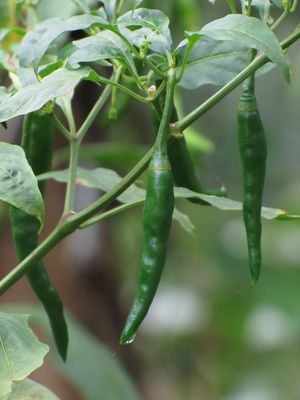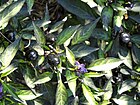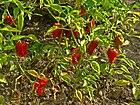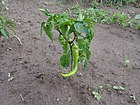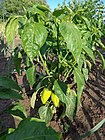Note: This is a project under development. The articles on this wiki are just being initiated and broadly incomplete. You can Help creating new pages.
Capsicum annuum - Katphala
Capsicum is a popular species cultivated world wide. Despite being a single species, the capsicum annum has many forms, with a variety of names, even in the same language.
Contents
- 1 Uses
- 2 Parts Used
- 3 Chemical Composition
- 4 Common names
- 5 Properties
- 6 Habit
- 7 Identification
- 8 List of Ayurvedic medicine in which the herb is used
- 9 Where to get the saplings
- 10 Mode of Propagation
- 11 How to plant/cultivate
- 12 Commonly seen growing in areas
- 13 Photo Gallery
- 14 References
- 15 External Links
Uses
Cold, Fevers, Asthma, Digestive problems, Skin eruptions, Sprains, Unbroken chilblains, Neuralgia, Pleurisy
Parts Used
Chemical Composition
Capsaicin, a red colouring matter, oleic, palmitic and stearic acids[1]
Common names
| Language | Common name |
|---|---|
| Kannada | |
| Hindi | Shimla mirch |
| Malayalam | |
| Tamil | |
| Telugu | |
| Marathi | NA |
| Gujarathi | NA |
| Punjabi | NA |
| Kashmiri | NA |
| Sanskrit | |
| English | Capsicum, Sweet Pepper |
Properties
Reference: Dravya - Substance, Rasa - Taste, Guna - Qualities, Veerya - Potency, Vipaka - Post-digesion effect, Karma - Pharmacological activity, Prabhava - Therepeutics.
Dravya
Rasa
Katu
Guna
Laghu, Ruksha
Veerya
Ushna
Vipaka
Katu
Karma
Kapvata shamaka, Pitta vardhaka
Prabhava
Habit
Identification
Leaf
| Kind | Shape | Feature |
|---|---|---|
| Simple | alternate | Elliptical to lanceolate, with smooth margins (entire) |
Flower
| Type | Size | Color and composition | Stamen | More information |
|---|---|---|---|---|
| Unisexual | around 1.5 cm | Yellow | 5 | The small flowers are borne singly or, rarely, in pairs in the axils |
Fruit
| Type | Size | Mass | Appearance | Seeds | More information |
|---|---|---|---|---|---|
| Berries pod | 7–10 mm (0.28–0.4 in.) long pome | Ripening to green, yellow, orange, red, or purple | But with no sutures—that vary considerably in size and shape | many | {{{6}}} |
Other features
List of Ayurvedic medicine in which the herb is used
- Vishatinduka Taila as root juice extract
Where to get the saplings
Mode of Propagation
How to plant/cultivate
Capsicums (Capsicum annuum) and chillies (Capsicum frutescens) are cultivated as annual vegetables while the edible parts are botanically fruit.[3]
Commonly seen growing in areas
Landscape in vegetable gardens, Landscape as cultivated
Photo Gallery
References
External Links
- Ayurvedic Herbs known to be helpful to treat Cold
- Ayurvedic Herbs known to be helpful to treat Fevers
- Ayurvedic Herbs known to be helpful to treat Asthma
- Ayurvedic Herbs known to be helpful to treat Digestive problems
- Ayurvedic Herbs known to be helpful to treat Skin eruptions
- Ayurvedic Herbs known to be helpful to treat Sprains
- Ayurvedic Herbs known to be helpful to treat Unbroken chilblains
- Ayurvedic Herbs known to be helpful to treat Neuralgia
- Ayurvedic Herbs known to be helpful to treat Pleurisy
- Herbs with Flowers used in medicine
- Herbs with Fruits used in medicine
- Herbs with Leaves used in medicine
- Herbs with common name in Hindi
- Herbs with common name in English
- Habit - Stout herb
- Index of Plants which can be propagated by Seeds
- Herbs that are commonly seen in the region of Landscape in vegetable gardens
- Herbs that are commonly seen in the region of Landscape as cultivated
- Herbs
